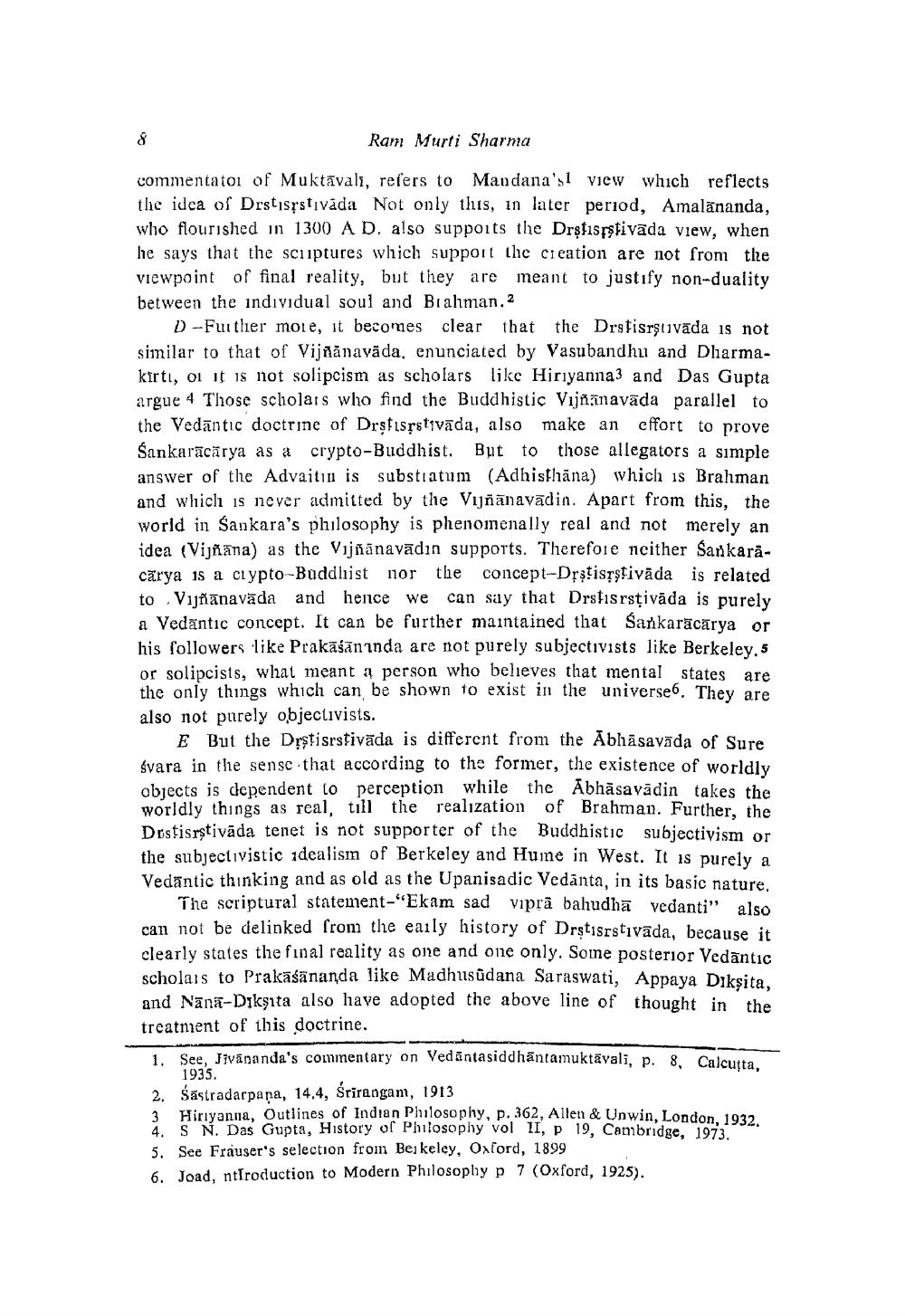________________
Ram Murti Sharma
commentator of Muktavali, refers to Mandana'sl view which reflects the idea of Drstisșstivada Not only this, in later period, Amalānanda, who flourished in 1300 AD. also suppoits the Drşfisstivāda view, when he says that the sculptures which support the creation are not from the viewpoint of final reality, but they are meant to justify non-duality between the individual soul and Brahman.2
D-Fui tlier more, it becomes clear that the Drstisrşuvāda is not similar to that of Vijñānavāda, enunciated by Vasubandhu and Dharmakirti, or it is not solipcism as scholars like Hiriyanna3 and Das Gupta argue 4 Those scholars who find the Buddhistic Vijnanavāda parallel to the Vedāntic doctrine of Drştısșstivāda, also make an effort to prove Sankarācārya as a crypto-Buddhist. But to those allegators a simple answer of the Advaitun is substratum (Adhisthāna) which is Brahman and which is never admitted by the Vijñānavādin. Apart from this, the world in Sankara's philosophy is phenomenally real and not merely an idea (Vijñāna) as the Vijñānavādin supports. Therefore neither Sankaracārya is a crypto-Buddhist nor the concept-Drştisīstivāda is related to Vijñānavada and hence we can say that Drsfisrstivāda is purely a Vedantic concept. It can be further maintained that Sankarācārya or his followers like Prakāśānında are not purely subjectivists like Berkeley, 5 or solipcists, what meant person who believes that mental states are the only things which can be shown to exist in the universe. They are also not purely objectivists.
E But the Drştisrstivāda is different from the Abhāsavāda of Sure svara in the sense that according to the former, the existence of worldly obiects is dependent to perception while the Abhāsavādin takes the worldly things as real, till the realization of Brahman. Further, the Drstis stivāda tenet is not supporter of the Buddhistic subjectivism or the subiectivistic idealisin of Berkeley and Hume in West. It is purely a Vedantic thinking and as old as the Upanisadic Vedānta, in its basic nature.
The scriptural statement-"Ekam sad viprā bahudhā vedanti" also can not be delinked from the eaily history of Drştisrstivada, because it clearly states the final reality as one and one only. Somne posterior Vedāntic scholars to Prakasananda like Madhusudana Saraswati, Appava Diksita and Nānā-Dikşita also have adopted the above line of thought in the treatment of this doctrine. 1. See, Jivananda's commentary on Vedāntasiddhantamuktävali, p. 8. Calcutta
1935. 2. Sāstradarpara, 14.4, Srirangam, 1913 7 Hiriyanna. Outlines of Indian Philosophy, p. 362, Allen & Unwin, London, 1932 4. S N. Das Gupta, History of Philosophy vol II, p 19, Cambridge, 1973. 5. See Frauser's selection from Bej keley, Oxford, 1899 6. Joad, ntIroduction to Modern Philosophy p 7 (Oxford, 1925).




